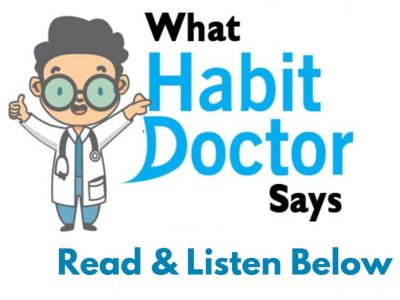Adolescents are enslaved by the habits they form. In adolescents there is a transition from childhood to adulthood and at the time new habits are developed and formed in everybody’s life. Children entering adolescence go through a lot of changes (physical, intellectual, personality and social developmental). Puberty occurs on average earlier than in the past, marks the start of adolescence. It’s a duty that most teenagers don’t think about while they’re growing up: how they’re in charge of developing habits of living that will dictate a lot of how they’ll act when they’re on their own.
Law of formative effect
Because they are so focused on the present, many teenagers are unaware of the law of formative effect: We are likely to act in the future in the same way we have been accustomed to behaving in the present. Because a young person creates habits (patterns of repeated behaviour) by repeated ways of acting, practice might make permanent.
Good habits
Good habits are self-sustaining and even self-enhancing, such as when a teenager develops the habit of being diligent, exercising, or preparing ahead. When an adolescent develops a pattern of quitting, cheating, or lying, it is self-defeating and even self-destructive. At their best, habits provide effective routines, organisational systems, and self-discipline that allow a young person to live a life that suits them. In the worst-case scenario, they contribute to compulsions, obsessions, and addictions that lead to the young person’s escalating unhappiness.
Repetition
People are dominated by repetition, whether they follow good or harmful habits since humans are not simply creatures of habit; they are captives of habit. Much of how we act today will determine how we act tomorrow.
When young people move out from home during the trial independence era of adolescence (ages 18-23), they must tackle the personal baggage they bring with them, including behaviours like procrastination, reckless spending, and disappearing into endless video and computer entertainment. Last-stage teenagers learn that good habits are difficult to establish and harmful habits are difficult to break.
A good example is one’s eating habits. Because one’s psychological and physical systems are so historically opposed to giving them up, they are very difficult to change in any permanent sense by dieting. People become quite acclimated to what they like to eat, how much they like to eat, and how often they prefer to eat.
Concentrated Energy
To get the new habit off the ground and up and flying, it needs a disproportionate quantity of concentrated energy. Reminders to periodically activate the habit, repetition to develop consistency of practice, and reward to recognise accomplishment are the three Rs of building a good habit.
Stopping a harmful habit leads to a loss problem. Acknowledgement of the behaviour’s negative repercussions, Assertion of commitment to change, and having an Alternative way to behave when the old temptation arises are the three A’s of quitting a harmful habit.
Parent’s Role
Given the power of habit, parents must help their adolescent develop good habits of living where they can, and provide the teenager with a technique for changing unhealthy habits that he or she may unknowingly acquire along the road if that is what the young person wants to do. Because everyone has a mix of good and bad habits, parents can educate their teen that the struggle with habits, how to install good ones and how to uninstall bad ones, is a lifetime part of the human experience. Because we must rely on our habits every day, managing this balance takes a lot of effort in life.
Unconscious functioning
Habits function mostly unconsciously; similar to programmes that are carried out with little or no conscious thought; they generate their momentum as they become desired to repeat. Habits are essential because they help us to be predictable, behave naturally, and complete tasks quickly.
Goal-Oriented
Habits are goal-oriented and functional in that they have an aim and serve a purpose. Habits can be beneficial when they help us maintain and improve our performance, or they can be detrimental when they undermine and hurt our ability to work effectively. It’s more difficult to develop a good habit than it is to stop one; it’s easier to develop a bad habit than it is to stop one. Habits are so strong because they are routine, and they frequently repeat themselves without being noticed by conscious regulating thinking.
Habits are acquired patterns of behaviour that, with practice, become ingrained in how we behave ourselves, take care of ourselves, and get things done regularly. Good habits are self-sustaining and even self-enhancing, such as when a teenager develops the habit of being diligent, exercising, or preparing ahead. At their best, habits provide effective routines, organisational systems, and self-discipline that allow a young person to live a life that suits them.
For more clarifications contact Habits Doctor at ‘Living in Wellbeing’.



Motivation to overcome challenges and grow. The blog is a roadmap to personal transformation